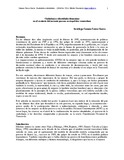| dc.description.abstract | Ciudadanía e Identidades Femeninas en el Contexto del Reciente Proceso Sociopolítico Venezolano
(García R., Carmen Teresa)
Resumen
En los últimos diez años (explosión social de febrero de 1989, instrumentación de políticas económicas de ajuste en 1989 y en 1996, dos golpes de estado en 1992, enjuiciamiento y destitución del Presidente de la República en 1994, empobrecimiento de la población, etc.) el país reclamaba transformaciones sustanciales ya que su forma de gerenciarlo lo llevó a la crisis en todos los ámbitos; la misma se venía manifestando, en particular, por la deslegitimación de los últimos gobiernos. Estos deseos de cambios fueron expresados muy claramente en las elecciones del 6 de diciembre de 1998. Y desde este momento las mujeres y los hombres comenzamos a discutir cuáles cambios queríamos.
Las organizaciones no gubernamentales (ONGs) de las mujeres (que en este período también se fortalecieron) se alistaron y, a través de diferentes estrategias echaron andar un proceso de discusión nacional sobre su condición y su situación de discriminación, a través del cual, pudimos constatar la diversidad de formas de construir y/o abordar el ser mujer en la Venezuela de fin de siglo.
En este contexto, observamos diferentes formas de vernos, actuar y pensarnos. Resaltamos por cuestiones de espacio, dos expresiones de las mismas. Por una parte, se destacan a grupos de mujeres dispuestas a ejercer su condición de ciudadanas y, que a la larga, sus luchas permitirán profundizar la "democracia" que tenemos, vale decir, permitirá democratizar no solo el país sino también la escuela, la universidad, la casa y, sobre todo, las relaciones entre los sexos; por otra parte, observamos un gran grupo de mujeres (y también muchos hombres) que se alinearon a los planteamientos de la jerarquía de la iglesia católica venezolana que está todavía anclada a los modelos de mujer tradicional, donde se resalta, particularmente, su rol reproductor (madre, esposa y ama de casa).
Este artículo en concreto, tendrá tres partes: la primera hará una síntesis de la situación del país en los últimos diez años que desembocó en este proceso; en segundo lugar, la reconstrucción -grosso modo- de la participación (directa o indirectamente, autónoma o alineada a otros intereses) de las mujeres en dicho proceso y en la Asamblea Nacional Constituyente (ANC) y, en tercer lugar, los avances en el nivel de la conformación de nuevas identidades, el ejercicio de la ciudadanía y los derechos conquistados y plasmados en la nueva Constitución Nacional de Venezuela.
Citizenship and Feminine Identity within the Context of Recent Venezuelan Sociopolitics
(García R., Carmen Teresa)
Abstract
In the last ten years Venezuela has undergone substantial change due to the way that affairs of state have been managed in all areas. Former administrations have been discredited and this has had the effect of increasing the rate of change. The desire for change was clearly expressed in the results of the elections on 6 December 1998.
From this time on men and women began to discuss the sort of changes which they wanted to see brought about. The women's organizations were deployed, and using various strategies they initiated a discussion process at the national level in repect to the conditions confronting Venezuelan women.
An approach to the woman as she appears at the turn of the century as a distinct political and social being was elaborated . In this context we can see that there are various ways of viewing ourselves, of acting and of thinking.
The situation has been discussed in terms of space, living space or lifestyle. On one side we have women who are interested in excercising their rights as citizens and who wish to struggle for the strengthening of the existing democracy. This is seen to extend to many areas: school, the university, the home and above all the relationships between the sexes. On the other side we have a large group of women (and many men) who adhere to the concepts of hierarchy as set out by the Catholic church, which in Venezuela is still governed by models of the woman as she has been traditionally viewed, accentuating in particular her role in the reproduction of children.
This paper is actually divided into three parts. The first is a synthesis of the situation which this country has faced in the last ten years. The second is the reconstruction in mass of women's participation in the democratization process (direct or indirect, independent or allied with other interests). The third part is devoted to the realization of new identities, the exercise of hard won civil rights now stated in the new National Constitution. | es_VE |


